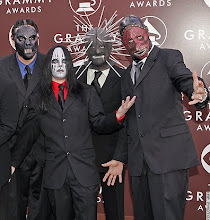by SURGA AZIZ on Nov.22, 2009, under
Brian Welch grew up in Bakersfield, a central California city nicknamed "Bako" for its scorching desert heat. In 1980, while listening to a drum solo on an 8-track Queen tape, the ten-year-old boy decided he wanted to play drums. But his dad talked him out of it, recommending the guitar instead. He started taking lessons.
"I instantly got good," Welch said. "I had an ear for music. I was figuring out heavy metal songs by Ted Nugent, Ozzy Osbourne, and Queen really quick the first couple of years."
While his talents as a guitar player progressed and he played in various bands, Welch said he also developed a "paralyzing fear" that haunted him even as he gained riches and fame—a condition he attributes to his father's angry outbursts, as well as bullies who picked on him and nicknamed him "Head."
By high school, Welch had met most of the members of what later would become Korn. It was here near Death Valley where Welch and fellow guitarist James "Munky" Shaffer developed the groundbreaking band's heavy, growling metal-influenced sound using 7-string guitars, a phenomenon that ultimately helped Korn sell more than 30 million records and spawned a host of imitators.
According to J.R. Goldman—an Upland, California guitar instructor at Jam It Music who gave Shaffer and Welch guitar lessons during their early days in Bakersfield—youth worldwide connected with the band's angry lyrics, raging against the social ills their generation had inherited.
"They sang about what it was like to suffer alienation as a kid," Goldman said. "[Lead singer Jonathan Davis, a former coroner's office employee] said he was picked on a lot at school and he wrote about what it felt like and his thoughts of suicide. He wound up connecting with millions of kids suffering the same thing—abuse, molestation, shame, and embarrassment. But he was blatantly singing about what had happened to him, venting on his records about his anger and pain."
In 1992, the band started playing clubs throughout the Los Angeles area and eventually landed a record deal. During this time, Welch began using drugs and became addicted to speed—and also met his future wife, Rebekah.
"When we got the record deal, it just took off quick," Welch said. "By our Ozzy Osbourne tour, we had a Gold record. And then boom, we started selling 150,000 records a week. That's when the partying started and the egos came. That's when the girls came, the schedule got harder, and the demands got bigger. It was crazy."
As the band's popularity grew, the partying and mayhem intensified during the Ozzfest and Korn's own Family Values tours. Sometimes when Welch and Rebekah were together, they were physically abusive toward each other. The couple nevertheless bought a home in Redondo Beach together. When she became pregnant, they married shortly after in March 1998.
But despite several attempts to free himself from his addiction, nothing—not even the birth of his daughter, Jennea—could spur him to quit drugs for good. As the pressures of the business increased, his addictions worsened. And despite playing Woodstock 99, the biggest show of the band's career, Welch soon after got into a fight with his wife after the concert and punched her in the face.
Rebekah left him in 2000, falling into a new crowd of drug addicts—as it turns out, she was having an affair with a known skinhead and felon. When she failed to attend the court date concerning Jennea, Welch gained full custody. "But instead of getting my life together, I got stressed out and started drinking and partying more. So in 2003 and 2004, I got hooked on methamphetamines massively. I snorted lines every day to get up. It was likMengenai Saya
Followers
SLIPKNOT




Friend Teman
Blog Archive
-
▼
2010
(6)
-
▼
Juni
(6)
- CHICAGO - The members of Korn are about to get a b...
- The Rise to RuinBrian Welch grew up in Bakersfiel...
- Brian Welch <!-- /firstHeading --> <!-- body...
- Korn <!-- /firstHeading --> <!-- bodyContent...
- Basis Slipknot Meninggal Dunia Pradipta Nugraha...
- Slipknot<!-- start content --> Slipknot Penamp...
-
▼
Juni
(6)

0 komentar